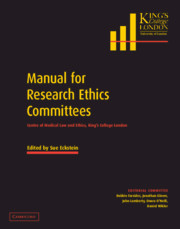Book contents
- Frontmatter
- Contents
- Editorial board
- Acknowledgements
- List of contributors
- Introduction
- Part I
- 1 The ethics of clinical research
- 2 Research ethics committees and the law
- 3 The regulation of medical research: a historical overview
- 4 The regulation of medical research in the UK
- 5 Observational and epidemiological research
- 6 Social survey research
- 7 Approaching qualitative research
- 8 Complementary and alternative medicine: challenges for research ethics committees
- 9 The ethical review of student research in the context of the governance arrangements for research ethics committees
- 10 The ethics of genetic research
- 11 Research or audit?
- 12 Randomised controlled trials
- 13 Determining the study size
- 14 Risk assessment for research participants
- 15 Absorbed radiation in patient and volunteer studies submitted to the ethical committee: a memorandum
- 16 A guide to the use of radioactive materials and radiological procedures for research purposes
- 17 Indemnity in medical research
- 18 The prevention and management of fraud and misconduct: the role of the LREC
- 19 Understanding clinical trials: a model for providing information to potential participants
- 20 The law relating to consent
- 21 Writing information for potential research participants
- 22 The law relating to confidentiality
- 23 Research involving vulnerable participants: some ethical issues
- 24 The ethics of research related to healthcare in developing countries
- Part II
- Index
5 - Observational and epidemiological research
Published online by Cambridge University Press: 08 January 2010
- Frontmatter
- Contents
- Editorial board
- Acknowledgements
- List of contributors
- Introduction
- Part I
- 1 The ethics of clinical research
- 2 Research ethics committees and the law
- 3 The regulation of medical research: a historical overview
- 4 The regulation of medical research in the UK
- 5 Observational and epidemiological research
- 6 Social survey research
- 7 Approaching qualitative research
- 8 Complementary and alternative medicine: challenges for research ethics committees
- 9 The ethical review of student research in the context of the governance arrangements for research ethics committees
- 10 The ethics of genetic research
- 11 Research or audit?
- 12 Randomised controlled trials
- 13 Determining the study size
- 14 Risk assessment for research participants
- 15 Absorbed radiation in patient and volunteer studies submitted to the ethical committee: a memorandum
- 16 A guide to the use of radioactive materials and radiological procedures for research purposes
- 17 Indemnity in medical research
- 18 The prevention and management of fraud and misconduct: the role of the LREC
- 19 Understanding clinical trials: a model for providing information to potential participants
- 20 The law relating to consent
- 21 Writing information for potential research participants
- 22 The law relating to confidentiality
- 23 Research involving vulnerable participants: some ethical issues
- 24 The ethics of research related to healthcare in developing countries
- Part II
- Index
Summary
The scope of epidemiology
Epidemiology has been usefully defined as the study of the distribution and determinants of disease in human populations.
Most epidemiologists would regard the randomised controlled trial (RCT) as the ‘gold standard’ of experimental design, which produces the most reliable of results in the pursuit of the aims of epidemiology. Unfortunately, there are many situations in which the RCT is not feasible: either it is too expensive to run, or it is impossible to recruit enough patients, or it is ethically unjustifiable. In such circumstances, observational research methods are needed.
Types of epidemiological study
These can be either descriptive or analytic.
‘Descriptive’ encompasses quantitative studies, e.g. censuses and surveys, and qualitative studies, e.g. focus groups, and supply essential data for many analytic studies.
Analytic studies seek to establish relationships between diseases and their causes, and deal with quantitative data.
There are four main categories of analytic studies:
(i) Cohort
(ii) Case-control
(iii) Cross-sectional
(iv) Ecological
All these types of study are known as observational: that is, they involve observing what is happening, without interfering with the ‘natural’ situation. Randomisation in such a study means the selection of a random sample of the population for observation, and has nothing to do with random allocation of treatment, which is seen in an RCT.
Cohort study
As can be seen from the diagram, the design of the study is prospective – i.e. moves forward in time from identification of the ‘exposure’ (the putative causal factor) to measurement of the occurrence of disease (‘outcome’).
- Type
- Chapter
- Information
- Manual for Research Ethics CommitteesCentre of Medical Law and Ethics, King's College London, pp. 34 - 36Publisher: Cambridge University PressPrint publication year: 2003



